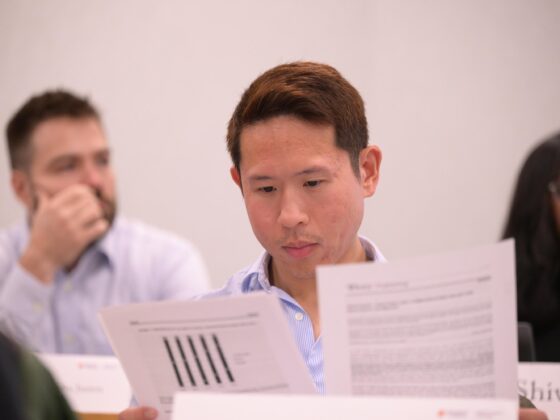We continue of application-related blog coverage with the first of two advice pieces featuring insights from current Darden Full-Time MBA students. Today, we start where all MBA applications start: school research. We asked some of our rising Second Year students for advice for prospective students related to researching MBA programs. Check out their answers below.
When it comes to researching MBA programs, what is one piece of advice you have for prospective students?
Teresa “Tess” Engebretson (Class of 2020)
I underestimated the value of visiting each program in person and over-indexed on research. I found it especially useful to connect with students that had similar pre-MBA backgrounds — it allowed me to see how they reacted to the case method, and how this teaching approach prepared them for what they wanted to do post-Darden. Finding people who were doing the type of work I wanted to do helped me envision — and feel confident about — my path at Darden.
Vita Wu (Class of 2020)
Try to talk to at least three students at the schools you’re considering. If possible, reach out to students who are different from each other (background, recruiting, involvement, etc.) but have a perspective you’re interested in learning more about. Looking at rankings or reading admission websites does not necessarily give you insight into the true culture of the school. “What support systems are effective and utilized?” “What does social life look like?” “How does learning happen?” You get a better gauge on questions like these that matter in your everyday B-school life when students share their stories. Getting more direct perspectives from students can also bolster your knowledge about programs and allow you to give more specialized answers on essays and in interviews.
Max Linden (Class of 2020)
While rankings can be a good place to start to understand programs, take the time to reach out to current students and alumni to see if you connect with them. See if the things they value about their MBA experience are aligned with your own priorities. At the end of the day, you are making a significant commitment to yourself and your future when you choose a program to attend. Finding a place that truly fits you will make it easy for you to express why you are interested in that program and will translate into greater success during your time there. You’ll feel more connected with alumni, classmates and enjoy a very special two years to the fullest! Don’t shortchange yourself in the pursuit of what others think you should do, or false expectations about what a program can deliver.
Cristina Wong-Namura (Class of 2020)
Take time to think about what you want out of your MBA. Prioritize your needs and goals and then see how different schools match up. Are you looking for an immersive and interactive classroom experience? Do you want to have international learning opportunities? How strong is the network? How important is diversity to the culture? These are all important factors and all schools have different offerings. Once you have gone through this exercise, do an in-person visit to the school to validate your assumptions and research. See how it feels to sit in on a class and walk through the buildings. Are people collaborating or mostly sitting silently studying on their own? The more data points you collect, the clearer the decision may be for you.

Mridul Mathur (Class of 2020)
While ranking can help differentiate a Top 10 school from a Top 50 school, once you’re within the top tier, high rankings do not directly translate into a better experience or opportunities (something that should be clear given the high variability across different rankings). That’s when it gets important to know the unique differences within each school. Differences in the program structure (core vs. elective); course delivery (case based vs. lecture based); class size (small vs. large); set-up (college town vs. metro); strengths in particular industry; function and geography; alumni base in target industries and geographies; and community culture and responsiveness can hugely affect your MBA experience and expectations.
Chloe Stegeman (Class of 2020)
Before taking to Google to delve into the search for “MBA Programs,” create a list of the top five to 10 criteria and attributes you want out of a program, and ultimately, a business school experience. There is an abundance of blogs, online resources and opinions that have compelling commentary on where one should go and the makings of an ‘ideal’ program; however, I think the best program is the program that serves you and your needs and helps to achieve your personal and professional post-MBA goals. Take the time to figure out what is meaningful and important to you — because if you know what you want and what you are about, it’s easier to identify what you aren’t about (in the business school search context, of course!).
Bingjing “Krystal” Yao (Class of 2020)
Rather than purely focus on rankings, be open-minded as you start your research your process and pick target schools you love and then dive deeper. Before adding a school to your application list, ask a few basic questions. What about the program is attractive to me? What about the program do I not like? Am I willing to make a trade-off between these two things? If so, to what extent? Now, write down your answers to these questions and begin chasing your dream.
AJ Amankwaa (Class of 2020)
Reach out to people (especially recruiters, if possible) in your target post-MBA industry or companies. Ask about their overall perspective on your current list of schools. From my experience, people are always willing to share recruiting information that would help MBA applicants with their school selection.
Allie Medack (Class of 2020)
Business school is an immersive experience and you want to be an environment that will enable you to be your best self and achieve your objectives. The best way to discover this is to visit the school, sit in on a class, and meet current students. That can be challenging, however, if you don’t live nearby. If you aren’t able to travel to see the school in person, find alumni in your area (LinkedIn stalking is normal — don’t be afraid to reach out to people!) or ask the Admissions team to put you in contact with current or former students who share your interests. Before applying to Darden, I visited Charlottesville over a weekend and also asked Admissions to introduce me to alumni in my city who worked for companies I was interested in. This not only gave me a sense of the Darden community (which is wonderful, I might add) but also helped me build my network early.
Pierce Lee (Class of 2020)
Research the alumni from the different MBA programs in which you’re interested. I found LinkedIn to be the most useful way to do this. Every school will have marketing materials on what industries and companies they send their graduates to. These are a great starter resource, but take the time to go deeper and look at specific alumni profiles in the industries, companies, or geographic locations in which you’re interested. Take note of the numbers of alumni from certain schools at those companies, how quickly they’ve been promoted, what their backgrounds were before pursuing an MBA, and any other factors that might be particularly relevant to your decision making process.
Morolake Thompson (Class of 2020)
If you’re applying through the Consortium process, choosing and then ranking schools for your Consortium application can be really challenging. As I was making these decisions, I had to remind myself of my core priorities — not just what I wanted to do after business school but also beyond. Here are the questions I found helpful:
- What kind of leader do you want to be?
- In which environment(s) do you thrive?
- What kind of experience would best fit both your goals and needs
The moment you tell people you’re even thinking about applying to business school, you’ll quick find that they have an opinion. Sometimes that opinion is positive and encouraging and sometimes it’s not. As well-meaning as advice can be, at the end of the day, the application process is personal. It’s important to be in tune with your #whyMBA and your core priorities.







